Summary of Findings

Americans are critical of President Bush’s job performance in many policy areas, but negative opinions of his handling of the economy and Iraq are doing the most damage to his overall approval rating, which now stands at 43%. Just 35% approve of the president’s handling of the economy, down from 43% in February and 45% in January.
With the level of violence rising in Iraq, Bush’s ratings also have slipped on that issue from 45% in January, to 40% in February, and 37% currently. Over the same period, positive opinions of his handling of foreign policy have fallen 10 points, to 38%. There has been greater stability in Bush’s marks on energy policy and Social Security, but he gets positive ratings of only about 30% on both issues (energy policy 31%, Social Security 29%).

The latest national survey by the Pew Research Center for the People & the Press, conducted May 11-15 among 1,502 Americans, shows that Bush gets positive marks from a majority of the public on just one issue his handling of terrorist threats. Currently, 57% approve of his job performance in that area.
An analysis of opinions on Bush’s job performance shows that views of his handling of the economy are now the biggest factor influencing his overall rating, with Iraq nearly as important. Terrorism is less of a factor than either of these issues, although it may be preventing Bush’s overall rating from slipping further.
Negative opinions of Bush’s handling of Social Security outnumber positive ones by about a two-to-one margin (59%-29%), but this issue does not heavily influence Bush’s overall job rating. However, Bush’s association with a plan to limit the growth of Social Security benefits appears to undermine support for the concept.
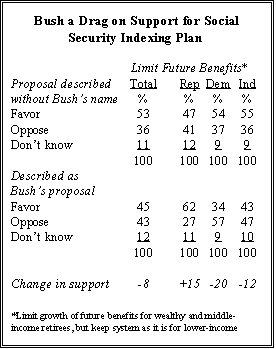
Most Americans say they would support limiting the growth of benefits for wealthy and middle-income retirees, while keeping the current system intact for lower-income people. But support is significantly lower when the proposal is explicitly associated with Bush. By a 53% to 36% margin, Americans generally favor the idea of limiting benefit growth for wealthy and middle-income Americans, but when the same idea is preceded by the phrase “George W. Bush has proposed…” the public is divided (45% in favor, 43% opposed).
Without any mention of Bush, the proposal is slightly more popular among Democrats than Republicans. But when the proposal is attributed to Bush, Republican support is 15 points higher (62%), and Democratic support is 20 points lower (34%).
While partisanship is a large factor, Bush also faces problems on Social Security policy among political independents. Support among independents for limiting future benefit growth for wealthy and middle- income retirees drops 12 points, from 55% to 43%, when the proposal is attributed to the president.
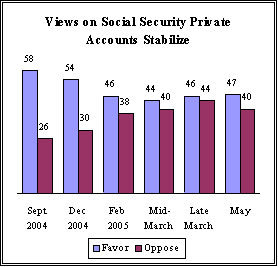
Meanwhile, public support for adding private accounts to Social Security, which declined over the winter, has largely stabilized over the past three months. Since February, there has consistently been a slim plurality (currently 47%) in favor of the idea of allowing younger workers to invest a portion of their Social Security taxes in private retirement accounts, though nearly as many (40%) are opposed. Bush’s endorsement of this proposal is not mentioned in this survey question.
Losing Ground
On many key issues, from the budget deficit and Social Security to education and illegal drugs, more Americans think the country is losing ground than say it is making progress or holding its own.
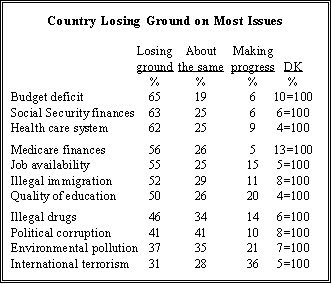
The exception is international terrorism; even here, only slightly more say the country is making progress than backsliding (36% vs. 31%).
Nearly two-thirds of Americans (65%) say the country is losing ground on the budget deficit, and nearly as many say the same about Social Security’s finances (63%) and the health care system (62%). Majorities believe the country is losing ground on Medicare’s finances (56%), the availability of good jobs (55%), and illegal immigration (52%), while half view the quality of education slipping.
Perceptions that the nation is losing ground in health care have grown sharply over the past decade or so. In 1994, about half of Americans (49%) thought the health care system was losing ground; currently, 62% say that. Opinions on the availability of good-paying jobs, which improved considerably from 1997-2001, have declined in recent years. Currently, 55% say the country is losing ground in this area; that is nearly as many as in 1994 (63%), before the late 1990s economic turnaround.
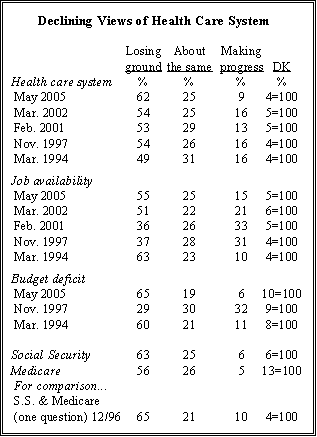
Not surprisingly, perceptions of the budget deficit have worsened considerably since 1997, when President Clinton and Congress reached an agreement to balance the budget. Currently, 65% say the country is losing ground on the budget deficit, more than double the number expressing that view in 1997 (29%).
Immigration Cuts Against the Grain
Democrats are decidedly more negative than Republicans in their perceptions of how the country is doing on most of these issues, with the biggest gaps over the availability of good-paying jobs and environmental pollution. Seven-in-ten Democrats say the nation is losing ground when it comes to good-paying jobs; just 37% of Republicans agree. And more than twice as many Democrats as Republicans feel the country is backsliding on environmental pollution (51% vs. 19%).
Yet in some cases notably, on illegal drugs and the quality of education the partisan differences are modest. Nearly half of Democrats (48%) say the country is losing ground on illegal drugs; a somewhat smaller plurality of Republicans (42%) agree. A narrow majority of Democrats (54%), and nearly half of Republicans (45%), say the quality of education has eroded.
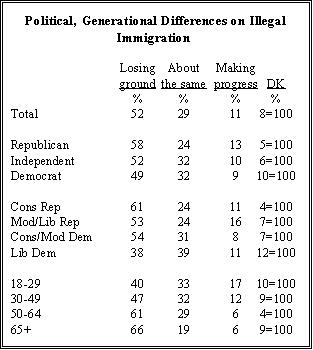
On immigration, the partisan pattern is reversed; more Republicans than Democrats believe the country is losing ground on immigration (58% vs. 49%). The differences are most pronounced between those at either end of the political spectrum. Six-in-ten conservative Republicans (61%) think the country is losing ground on illegal immigration compared with just 38% of liberal Democrats.
There also is a wide generation gap in opinions on illegal immigration. Two-thirds of Americans ages 65 and older (66%) say the country is losing ground on illegal immigration, and nearly as many of those ages 50-64 agree (61%). Young people are far less negative about illegal immigration. Just 40% of those under age 30 take a negative view of progress on illegal immigration.

